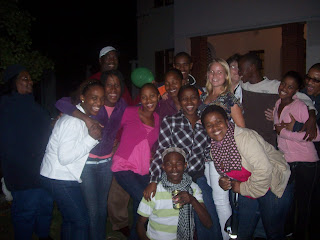
I don’t pretend to know everything about South Africa and I realize I have only been here for 3 months, so let me preface this with the fact that everything I say is entirely from my own perspective.

In the past 3 months all of us have ventured into townships whether it be for work, activist projects, the ANC rally, or just to visit friends. In fact, going into the townships has become such a regular occurrence for many of us, especially those working in Khayelitsha, that we don’t see or think of it as abnormal.

However, I found that whenever I talked to white South Africans about my time in the townships, I got the same shocked response. “You did WHAT?!” was common as was simply looking at me disapprovingly. I would continue to tell them how great it was and how much I enjoyed myself, but they didn’t hear any of it. They would tell me how unsafe it is and that I clearly don’t know what I’m doing because I don’t live here. Many people told me that if I were to live here, my views would change and I would realize it was a lost cause. Others would simply start making racial jokes, ending any forum for discussion. I found myself offended and shocked at such responses. I know racism exists and I know it is deeply ingrained in society, but to have it be so obvious took me completely off guard.

To be fair, there was the occasional person who was intrigued by what I had to say and was at least able to appreciate that things were changing for the better. Though, not a single local person I talked to had been into a township. I was amazed at the fact that people who actually live in Cape Town hadn’t seen such a huge part of their own country. I considered that it was just the people I was talking to and that they were not representative of the average person. However, Julie and I were talking to the woman in charge of the garden where we did our activist project and she said that the only white people who volunteer there are those from overseas.

During the last week of our trip, I stayed overnight in Khayelitsha with a friend. He had to be at school early in the morning so I took the train with him into Cape Town. It wasn’t that I was the only white person on a completely packed train that surprised me, because I was expecting that. It was the fact that people blatantly and unabashedly stared at me. It wasn’t in a rude way and I felt completely safe, but it was very clear that white people taking the train from Khayelitsha in the morning simply doesn’t happen. I wasn’t ready for it. I mean, I knew it was uncommon for white people to be in the townships especially over night, but I didn’t realize how outrageous my actions must have seemed.

I don’t understand how people can tell me not to go to these areas when they’ve never actually been themselves. It seems hypocritical to me and does nothing but perpetuate stereotypes that have little to no truth to them. I feel as though racism will always exist until these stereotypes are broken and people integrate. South Africa has such a great opportunity to do this as people are still open and hopeful for a better future. However, it is the responsibility of the richer populations to take charge on this. Poor people can’t simply move into rich neighborhoods or attend expensive private schools; it has to work the other way around.

 There was nothing that made me feel more like I belong here in South Africa than staying in the townships these past few weeks. Throughout the entire trip, I have been made to feel at home in so many situations and by so many people that it’s unreal but nothing comes close to the genuine welcome I received while in these areas that I was so quickly told to avoid.
There was nothing that made me feel more like I belong here in South Africa than staying in the townships these past few weeks. Throughout the entire trip, I have been made to feel at home in so many situations and by so many people that it’s unreal but nothing comes close to the genuine welcome I received while in these areas that I was so quickly told to avoid.Riding in mini bus taxis, playing dominoes in the street, buying 3 Rand grapes on the corner, waking up at 7am to children happily fooling around outside, going to visit friends without invitation, playing cricket with a scrap piece of wood, learning xhosa clicks or at least practicing them, going to the shebeen to catch the last minutes of the game. These are the memories that are fondest in my heart and this is the South Africa that I will always remember.














